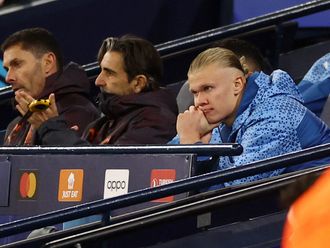Pyenongchang: Ester Ledecka of the Czech Republic stunned everyone by winning the gold in the women’s super-G on a busy Saturday at the Winter Olympics.
Switzerland’s Sarah Hoefflin won the women’s slopestyle skiing event, Norway was victorious in the women’s cross-country relay, and Slovakia’s Anastasiya Kuzmina won the women’s 12.5-kilometre mass start biathlon.
In Jeongseon, Ledecka simply couldn’t believe she was No. 1 on the videoboard standings moments after crossing the finish line.
Her time of 1 minute, 21.11 seconds was just 0.01 seconds faster than Austria’s Anna Veith, the defending Olympic champion. While Veith was one of the favourites, the 22-year-old Ledecka was a low-ranked competitor who is a part-time ski racer and part-time snowboarder.
She’s now an Olympic champion.
“Is this a kind of mistake?” Ledecka said when asked what immediately went through her mind. “OK, they’re going to change the time. I’m going to wait for a little bit, and you’re going to switch and (add) some more seconds.”
Nope, not quite.
At Phoenix Snow Park, Hoefflin edged teammate Mathilde Gremaud for gold by posting a score of 91.20 in her final run down the demanding course.
Marit Bjoergen moved into a tie for the most career Winter Olympic medals with 13 after helping the Norwegian women to a first-place finish in the cross-country relay.
Bjoergen tied male biathlete and fellow Norwegian Ole Einar Bjoerndalen, and can move into sole possession of first with a medal in either one of the final two women’s events: the women’s team sprint relay Wednesday or in the 50-kilometer mass start.
“I don’t think about that now,” Bjoergen said. “I’m just focused on each race and I think I have to look behind me after the Olympics and see how many medals I have.”
Sweden finished second, and a team of Russians were third.











